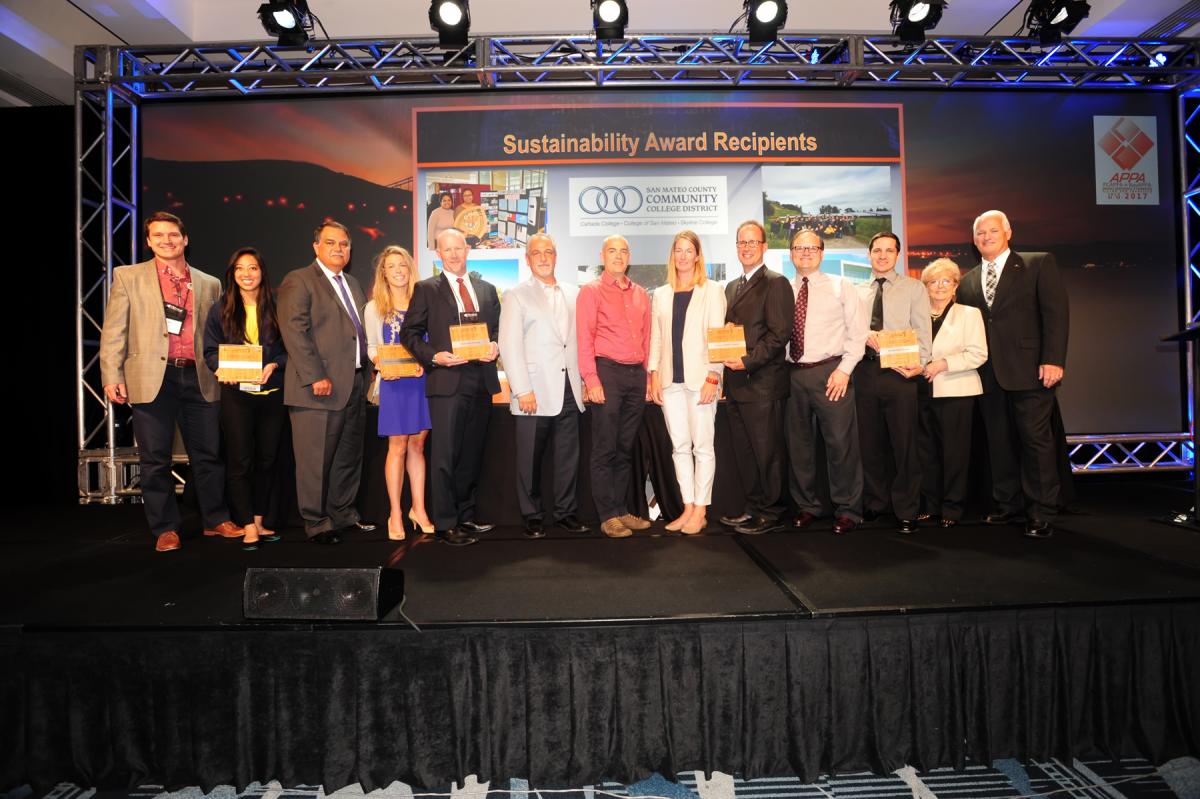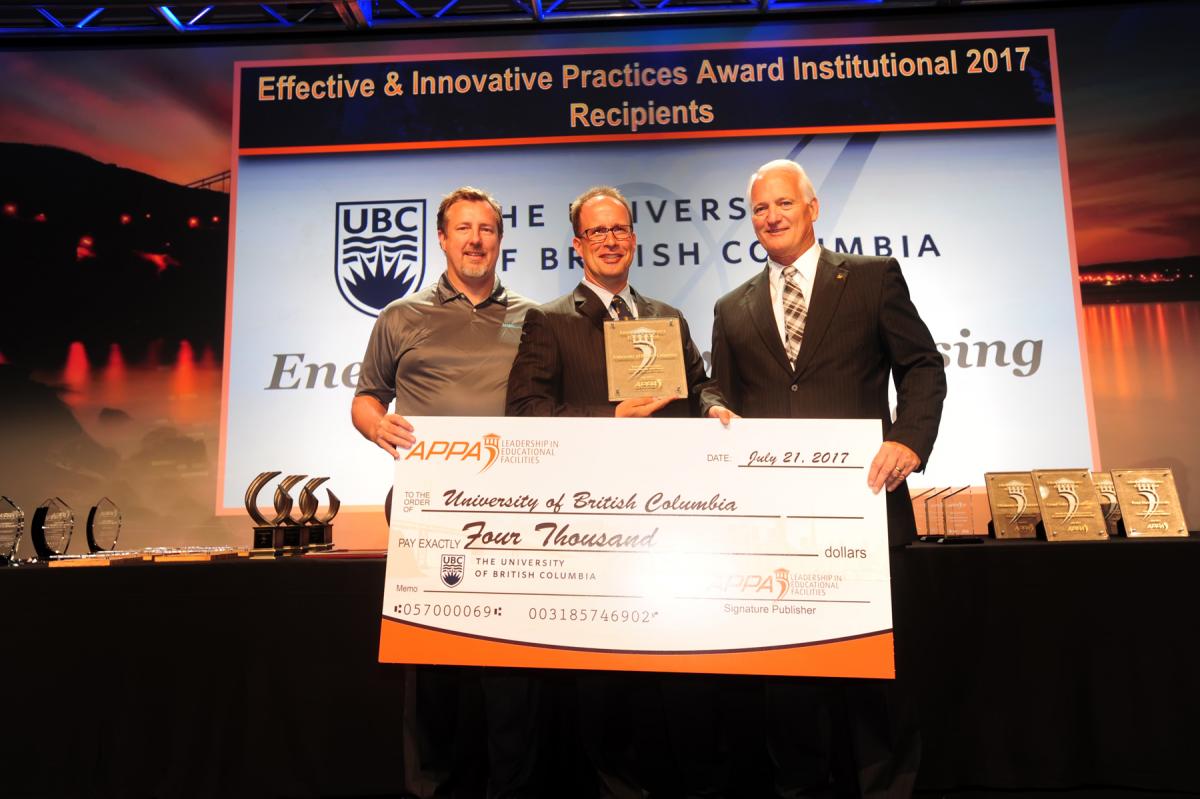
For a second time in six years, the University of British Columbia (UBC) was honoured with a Sustainability Award from APPA: Leadership in Educational Facilities. The award recognizes efforts to embed sustainable policies and practices across the institution.
“We’re honoured to receive this award. It’s a recognition of our successful efforts to embed sustainability throughout the university from the 20-year Sustainability Strategy, the 2020 Climate Action Plan, and energy innovation projects, to the SEEDS Sustainability Program that brings together faculty, students and staff to address campus sustainability challenges,” said John Madden, director, sustainability and engineering with Campus + Community Planning.
“Through integration with teaching, learning and research, we are ensuring evidence-based decision-making is applied in driving innovation that is transforming our campus into a model for urban sustainability.”

Frank Crudo, superintendent municipal services, building operations, Orion Henderson, director, energy planning and innovation, David Woodson, managing director, energy and water services, and Karyn Magnusson, managing director, building operations, jointly accept the Sustainability Award on behalf of UBC.
“The Sustainability Award criteria measure the current level and effort of a facilities management department to integrate sustainable policies and environmental practices throughout all facets of the organization, ultimately embedding them within the educational institution,” said Paul Wuebold, APPA’s vice-president, Professional Affairs, and the chair of the Awards and Recognition Committee.
In addition to the Sustainability Award, UBC also received the Effective and Innovative Practices Award for the Energy Conservation Using Campus Wi-Fi Data project. The project advances UBC’s energy conservation and climate action efforts through innovative use of new and existing technology.

David Woodson, managing director, energy and water services, accepts Effective and Innovative Practices Award.
“This energy conservation project exemplifies what we mean by a “living lab”. UBC staff worked with a graduate student to pilot a new software that uses Wi-Fi to determine the number of building occupants and adjust ventilation accordingly — saving energy without sacrificing air quality,” noted David Woodson, managing director, energy and water services.
“Based on our successful implementation and demonstration of this novel technology, other institutions are now interested in replicating this approach and the student venture is being spun off into a viable business.”
UBC’s 20-year Sustainability Strategy for the Vancouver campus transforms the entire UBC campus into a living laboratory. In this way, the University’s physical plant becomes a testing ground in which staff, students, faculty members, researchers and partners test, study, teach, apply and share lessons learned, technologies created and policies developed. Through partnerships, outcomes are applied beyond the campus, ensuring the University acts as agent of change to address some of society's most pressing sustainability challenges.
With more than 647 sustainability related courses, 400 researchers engaged in sustainability and 80-plus research organizations on campus, UBC continues to contribute, learn and collaborate on some of the most challenging sustainability issues facing the planet. UBC has also implemented rigorous tracking as a means to measure progress against defined goals and targets. We use the findings from our monitoring reports to further identify opportunities for improvements and to inform future policies, guidelines, standards and programs.
In 2016, UBC reduced its greenhouse gas (GHG) emissions 34 per cent relative to 2007 levels, achieving its aggressive target of 33 per cent reduction in GHG emissions by 2015. Achieving this significant reduction was made possible by completion of the new Academic District Energy System (ADES) in 2015, the continued operation of UBC’s signature living lab project, the Bio-energy Research and Demonstration Facility, the continuos optimisation of existing buildings and campus-wide engagement and behaviour-change initiatives. Now, the university is exploring solutions to advance toward achieving a 67 per cent reduction in GHG emissions by 2020 and a 100 per cent reduction by 2050.
Over the past two years, UBC earned a number of accolades for its sustainability efforts, including: Greenest Employer Award, International District Energy Association Innovation Award, Corporate Knights Future 40 Responsible Corporate Leaders Award, AASHE Stars Gold Rating, Bike to Work Week Award, Global Green Gown Award for Student Engagement, International Sustainable Campus Network Excellence in Building Award, and AASHE Case Study Award for Student Engagement.
APPA has developed the award criteria based on specific standards and processes applicable to management in educational facilities, including educational curriculum and research; leadership and administration; maintenance and operations; energy and utilities; planning and construction; sustainability indicators; and sustainability innovations.
The Sustainability Award categories were developed in collaboration with and support from the research and development work provided by the Association for the Advancement of Sustainability in Higher Education (AASHE). AASHE’s Sustainability Tracking, Assessment and Rating System (STARS) offers standards by which educational institutions may measure themselves for recognition of their campus environmental and sustainability achievements. UBC has to-date earned two consecutive Gold STARS ratings from AASHE.
For more information on UBC’s sustainability efforts explore our website or review our performance and progress in the 2015/2016 Annual Sustainability Report.